Just beet it – Top health benefits & 5 recipes with beets
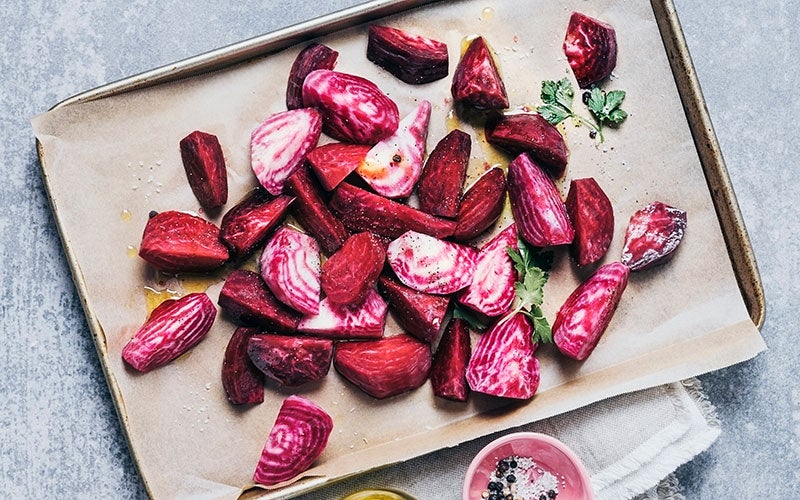 ©Claudia Totir
©Claudia Totir
Hot or not? While some of us might grimace at the mere thought of beetroot, others are completely blown away by the sight of them. When freshly harvested, these earthy tubers appear in the vegetable section every winter. But what nutrients do beets contain, and what are their health benefits? What do you need to know about buying, storing, and preparing beetroot? We have thoroughly researched and compiled the most important information about the winter vegetable. Plus: we’ve included our five favorite recipes with beetroot.
Hot or not? While some of us might grimace at the mere thought of beetroot, others are completely blown away by the sight of them. When freshly harvested, these earthy tubers appear in the vegetable section every winter. But what nutrients do beets contain, and what are their health benefits? What do you need to know about buying, storing, and preparing beetroot? We have thoroughly researched and compiled the most important information about the winter vegetable. Plus: we’ve included our five favorite recipes with beetroot.
Beetroot origin and season
Fresh beets can be found in the vegetable section and in regional markets every winter, generally from September to March. In addition to red beetroot, there are also yellow beetroot (golden beetroot) and white beetroot varieties.
What does beetroot taste like?
When fresh from the field, this plant has an earthy taste, which comes from the bicyclic alcohol geosmin produced by microorganisms in the soil. Paired with the right ingredients, however, the red roots lose this earthy taste – ever eaten pickled red beet from a jar?
Calories and nutrition – Why the beta vulgaris is so good for your health
The table gives the most important numbers. 100 grams of red beetroot contain about 46 calories.
| Nutrition | per 100g |
| Calories | 46kcal |
| Protein | 2g |
| Carbohydrates | 9g |
| Fats | 0.2g |
| Dietary Fiber | 2g |
Have you ever stumbled across the number E162 on food packaging? This approval number refers to the natural food additive betanin. That pigment naturally gives beetroot its beautiful color and is a source of lots of natural red colorings nowadays. (1)
This winter veggie boasts not only betanin, but also a number of other nutrients. Which ones exactly? We’ll tell you!
- Beets contain various secondary plant compounds, including flavonoids, polyphenols and saponins.
- Another benefit is all the dietary fiber they contain. Fiber is nearly indigestible and binds water in the body as a swelling and filling agent. As a result, food in the intestines is broken down more slowly.
- And what about vitamins? In addition to vitamin C, they provide various B vitamins (thiamine, folic acid, pyridoxine).
- The veggie also scores in terms of minerals. In addition to potassium, sodium, and phosphorus, the red tubers also contain calcium, magnesium, zinc, and iron.
Did you know that women on average have a higher iron requirement than men? Female adults should consume 15mg of iron a day, men 10mg. This is due to hormonal cycles and the associated blood loss during menstruation. As an essential trace element, iron is crucial for the transport of oxygen in the blood vessels and contributes to the normal functioning of the body.
- Similar to leafy, green spinach, beets and beet leaves contain nitrate, which is converted to nitric oxide (NO) when absorbed in the body.
Does beetroot help you lose weight?
Obviously, with its valuable ingredients, beet’s a booster for your well-being. But does the veggie also help with weight loss? Sorry to disappoint: No food causes noticeable weight loss on its own. Nevertheless, consuming beets as part of a balanced diet can contribute to a healthy and fit body.
It’s all in the mix! The path to feeling great in our bodies can seem tortuous sometimes. But with a combination of a focused nutrition plan and challenging workouts, you will reach your goal!
The best way to cook beet root
Grab disposable gloves for working with these tubers, so the red color does not stain the skin of your hands.
Depending on the recipe, you can cook beets in a pot, a pan, or the oven. If you decide to boil them in a pot, you can set a timer for about 30 minutes: put cold water on with salt, add your washed beets to simmering water, and cook over medium heat until done.
Important: Don’t peel your beets before cooking, otherwise the betanin will dye the cooking water, while the beets themselves will lose their pretty color.
Can you eat beets raw?
The answer is yes, you can eat raw beets. In fact, the human body benefits from eating the tuber raw because it contains the most nutrients.
You can peel fresh garden beet and squeeze it through your juicer for beetroot juice, or you can cut it into small pieces and blend into a beet juice smoothie with other fruits and veggies.
Another delicious option: add peeled and finely grated beets to a fresh salad or serve finely sliced as carpaccio.
Purchase and storage tips
Which beets should you buy? When shopping for beets, make sure the tubers you bring home have a smooth skin. If the beet greens are still attached, they should be lush and green. Just like radishes, smaller beets often taste more intense than their larger relatives. Once in the kitchen, beets stay fresh for a long time in the refrigerator – up to two weeks.
Our best recipes with beets
Have we won you over? Here are five un-beet-able recipes to get you started.
Red hummus on Protein Bread
Preheat the oven to bake our Vegan Protein Bread. While it’s getting crispy, get to work making a creamy spread. Take our basic hummus recipe and add a pre-cooked beet for a pink and creamy experience!
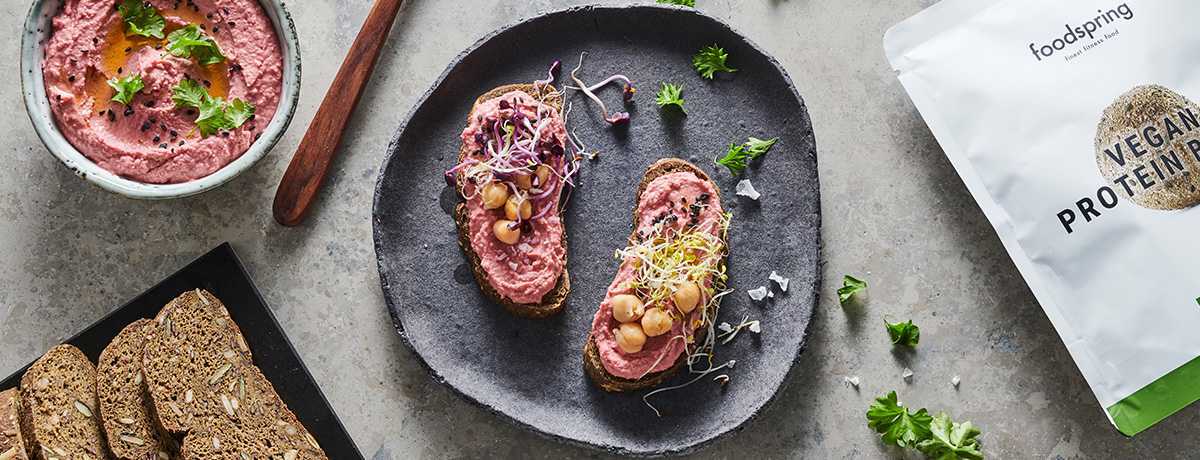
Winter Bruschetta
The season for pumpkin is just wrapping up, so bid winter a fond farewell with this deep and earthy bruschetta. The rich colors are a perfect match for the flavor!
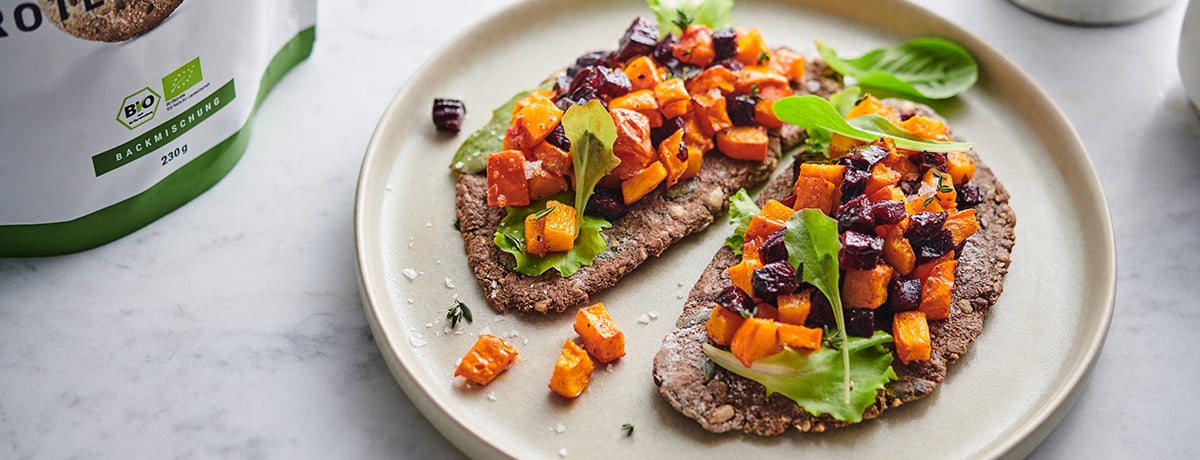
Red Beet Pasta
Have you already discovered our Protein Pasta in your diet? If not, then it’s high time you did, because in no time at all you can conjure up an irresistible red pasta with these noodles made from pea protein.
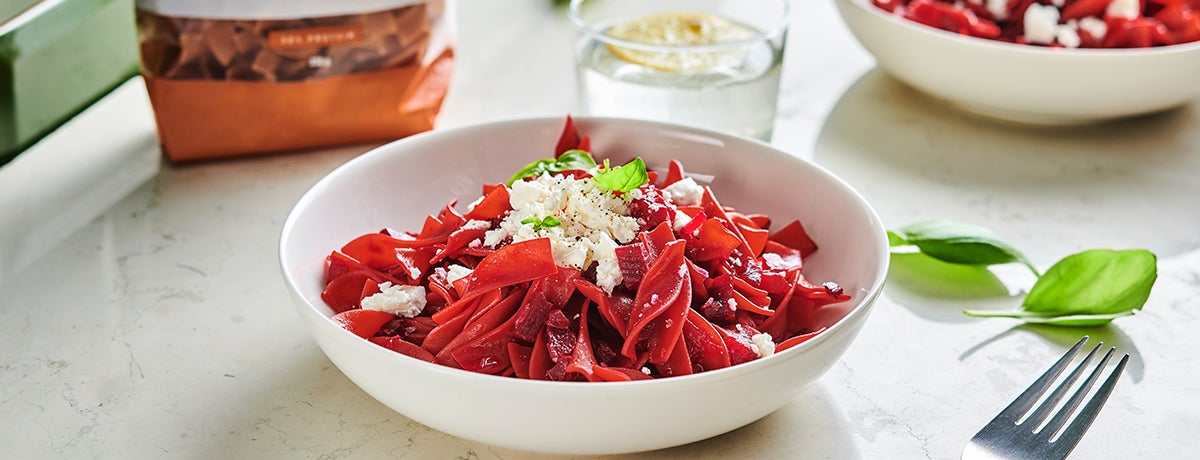
Plant-Based Beet Burger Patty
Grab a pen and paper and jot down the ingredients for another of our favorite winter veg recipes. In addition to fresh beets, you’ll need garlic and onions, kidney beans, tahini, and parsley. The result? A beet burger patty with an enticing color.

Red Velvet Protein Muffins
Okay, so this recipe doesn’t have beet in its original version, but it’s a hack: Try putting a cup of pureed beet or beetroot juice into our Red Velvet Cupcakes recipe for an even deeper and more natural red! You can thank us later.
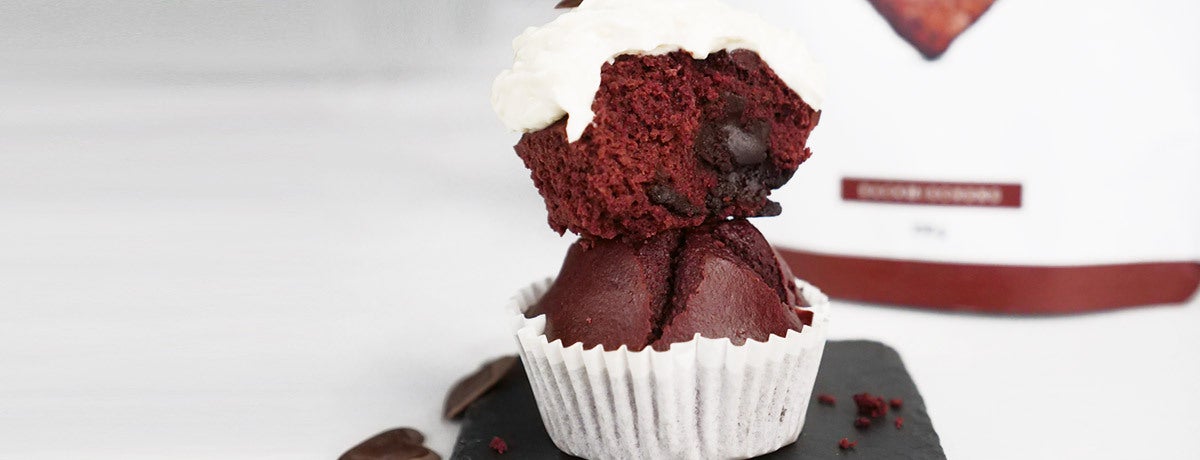
Want even more health tips? Then check out our complete collection of delicious fitness recipes. Whether you go for meat, vegetarian, or vegan, you’ll find colorful inspiration for your plate – from reinterpreted classics to food trends.
Summary
- As a regional winter veggie, fresh beets, as well as yellow and white beets, are harvested from September to March and have many health benefits.
- 100 grams of the veggie provide about 9 grams of carbohydrates as well as 2 grams of vegetable protein.
- In addition to Bs and vitamin C, the veggie is a source of various minerals, including potassium, magnesium, and iron.
- Cold smoothie, beetroot juice, crunchy salad, pesto with beet greens or a creamy soup – beet products can spice up your kitchen in so many ways!
Sources for this article
We at foodspring use only high-quality sources, including peer-reviewed studies, to support the facts within our articles. Read our editorial policy to learn more about how we fact-check and keep our content accurate, reliable, and trustworthy.





























